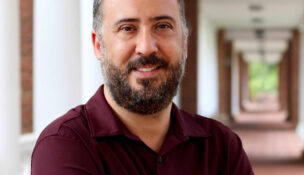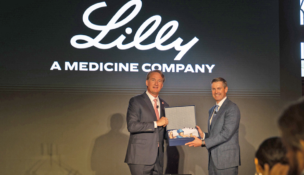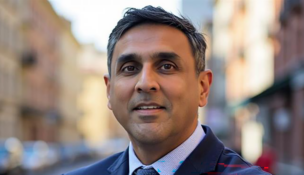U.Va. board votes to continue gender-affirming care for existing patients under 19
New patients will be referred to private providers until further notice
Kate Andrews //February 21, 2025//

Protesters supporting gender affirming care and transgender rights gathered on U.Va.'s Lawn during a Feb. 21 special meeting of the university's board of visitors. Photo by Kate Andrews, Virginia Business

Protesters supporting gender affirming care and transgender rights gathered on U.Va.'s Lawn during a Feb. 21 special meeting of the university's board of visitors. Photo by Kate Andrews, Virginia Business
U.Va. board votes to continue gender-affirming care for existing patients under 19
New patients will be referred to private providers until further notice
Kate Andrews //February 21, 2025//
During a Feb. 21 special meeting, the University of Virginia‘s board of visitors voted for UVA Health to continue providing gender-affirming treatment to people under 19, but only to current patients. New patients will instead be referred to “alternative private providers” until further notice.
Also, the BOV — a 17-member board named by Virginia’s governors — directs the voting members of its Health System Board to evaluate whether to continue providing such services. The full board also will “directly advise on compliance with any presidential executive orders in consultation with its legal counsel.”
The majority of the board — with the exception of former U.S. Rep. L.F. Payne voting no and Dominion Energy Chair, President and CEO Bob Blue and Dominion President–Dominion Energy Services Carlos Brown, who were both absent — voted to approve the resolution following a two-hour closed session at U.Va.’s Rotunda. Outside, a few dozen protesters beat drums and chanted in support of transgender rights.
U.Va.’s board resolution appears to strike a compromise, with current patients continuing to be served but non-patients being referred to private health care practices, many of which are fielding hundreds of calls from prospective patients who can no longer receive care at larger hospital systems that could stand to lose federal funding in the future, including Medicaid and research money.
The resolution says “the quality and stability of the care of patients by the university is of the utmost concern to the Board of Visitors” but notes, “the university receives significant federal funding each year and a loss of such federal funding would jeopardize the financial viability of the university.”
Doctors show up
Several U.Va. medical school professors and health care professionals — including some who are not involved in treating transgender teens — showed up to attend the brief public sections of the meeting before and after the lengthy closed session, when the board received legal advice. The board meeting did not allow public comment, but many of the physicians wore their white medical coats identifying them as doctors at a glance.
Several voiced concerns about an erosion of the doctor-patient relationship if the board or other political figures were able to influence or limit what kinds of medical treatments patients could receive.
Dr. Leslie Olsakovsky, an associate professor of medicine and an ophthalmologist who has been with U.Va. for 30 years, is the mother of a transgender son who previously received gender-affirming treatment at UVA Health but now as an adult lives outside the area.
“It was devastating to him and me to hear that there would be a restriction on providing appropriate care to a very fragile group of individuals who need to be protected and need to have good medical care,” she said. Receiving care at UVA Health, Olsakovsky said, was “very important” to her son and allowed him to come out as transgender.
As a physician, she said that she and other doctors at U.Va. believe that members of the government should not be involved in the doctor-patient relationship.
President Donald Trump issued a Jan. 28 executive order banning all gender-affirming medical treatment for patients under 19, even in Virginia, where the Virginia Human Rights Act in the state code explicitly protects people from discrimination related to their gender identity. Despite the state law, Gov. Glenn Youngkin and Virginia Attorney General Jason Miyares, both Republicans, have voiced support for the executive order’s limitations on medical care, and Miyares issued a directive to UVA Health and VCU Health enforcing Trump’s order last month.
Both health systems immediately suspended gender-affirming medical treatments for people under 19 who were included in the executive order, which banned puberty blockers, hormone medications and certain surgical procedures.
UVA Health, though, restarted care after a federal judge issued a two-week restraining order on Feb. 13, pausing enforcement of the president’s executive order. However, Virginia’s other university-based health system — VCU Health — has not resumed gender-affirming care after receiving “verbal guidance from the governor’s office that the Virginia attorney general’s prior directive that prohibits gender-affirming services outlined in the White House’s executive order still stands,” according to its statement.
Dr. Mohan Nadkarni, a professor of medicine and internal medicine physician at U.Va., said he understood “the difficult position that our leadership was placed in by the [Virginia] attorney general … so we had no choice but to shut down until the injunction occurred. I think leadership did the right thing by reinstating care at the time of the injunction.”
However, he retains concerns about the future for patients in the United States. “This is just the tip of the iceberg,” Nadkarni said. “There could be other executive orders or orders from the state demanding that physicians stop taking care of, for instance, undocumented immigrants or patients of a certain race or religion.”
Two thirds of U.Va.’s Board of Visitors are Youngkin appointees, and it was uncertain what course they would take at the special meeting, but a group of U.Va. faculty, alumni and UVA Health physicians, nurses and clinical staff sent an unsigned letter to the university’s board ahead of the meeting, arguing that “preemptive compliance” with executive orders that run contrary to state and federal law “would invite significant legal liability” for the university. The group called for gender-affirming treatments to continue.
Another group of transgender Virginians, their family members and other supporters sent a letter to officials at UVA Health, VCU Health and The Children’s Hospital of The King’s Daughters, which also suspended gender-affirming treatment following President Trump’s executive order, to advocate for continuing medical care for transgender youth.
“Our children, who deserve love, support, and the right to thrive, now face daunting uncertainty,
and we cannot remain silent about the profound impact of these decisions on their lives and our
families,” the letter reads in part.

Board comments
Board members declined to comment following the meeting, and few said anything other than voting “yes” or “no” when the meeting was reopened to the public. Rector Robert D. Hardie said he was voting “yes” with reservations.
Dr. David O. Okonkwo, a professor of neurological surgery at the University of Pittsburgh and a board member appointed by Youngkin in 2024, thanked the board “for recognizing the importance of maintaining the fidelity of the doctor-patient” relationship.
Board member Paul C. Harris, a former Republican delegate and currently executive vice president, chief sustainability and compliance officer at Huntington Ingalls Industries, added that “during closed session, we had robust discussion, and I appreciate the empathy [and] compassion” shown by board members. Harris is another Youngkin appointee.
Payne, a former Democratic congressman named to the board by former Gov. Ralph Northam, said he explained his “no” vote in open session but before members of the media and the public re-entered the boardroom. He declined to elaborate after the meeting.
l

















